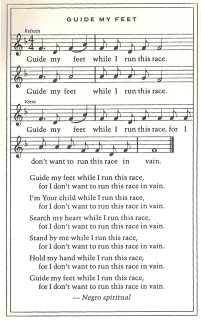
Our desire is a simple one: to hold fast the traditions of our ancestors and to remind some while introducing to others---a whole new generation---to the lyrical content and amazing power of the Negro Spiritual. At a time in history where the art of spoken word is making such an impact, we believe that the words found in these songs are worth speaking out loud again...and again...and again for the whole world to hear. Truly, this is a time in history where all should be encouraged to “Lift every voice and sing!”
We encourage you to take a moment as you stroll down your memory lane!
*Go back home just for a second and remember hearing grandma hum that same ole' familiar tune as she went about her daily chores.
*Reminisce on the harmonies of the street light quartet underneath your bedroom window.
*Stand again at the grave site of a loved one.
*Sit down in the reserved family pew during the morning service and listen as the church choir as they render your best loved spiritual.
Turn up the volume in the front room and listen to Aretha...Mahalia...the Fisk Jubilee Singers or the Golden Gate Quartet's rendition of Swing Low or Go Tell It on the Mountain...songs which left their imprint on your soul; songs that are never to be forgotten.
These songs...these heartfelt prayers put to music have simply-yet-profoundly continued to remind us of who we are and where we have come from. (Lest We Forget)
The messages found in these lyrics serve as constant reminder of the toil, the blood, the sweat and tears made by those who came before us in a time not so far from here.
(Sometimes I Feel Like a Motherless Child, Nobody Knows the Trouble I've Seen)
These prayers set to music connect us to their perseverance... courage...tenacity and foresight. As our President Obama so eloquently entitled his book, these songs speak to the audacity of hope...the audacity of Black pioneers: Harriet Tubman, Fredrick Douglas,Booker T. Washington, Marcus Garvey, Rosa Parks and Martin Luther King, Jr. and so many others.
“With the reverence we feel for the spirituals today. It's hard to understand the furor that the idea of singing them evoked back then. For some, the painful 'sorrow songs' were a relic best left behind with slavery. Others could not fathom that anyone would appreciate what they cruelly demeaned as 'darky songs'. And still others did not recognize the unique richness of the music with its distinctive African-based pen tonic(five -tone) melodies. Rejecting the songs in pursuit of so-called sophistication, many ignored the fact that they were thus trying to emulate the cultural values of the very people who had bartered their lives as chattel.”---an excerpt from “Glory Days” by author Janus Adams




No comments:
Post a Comment